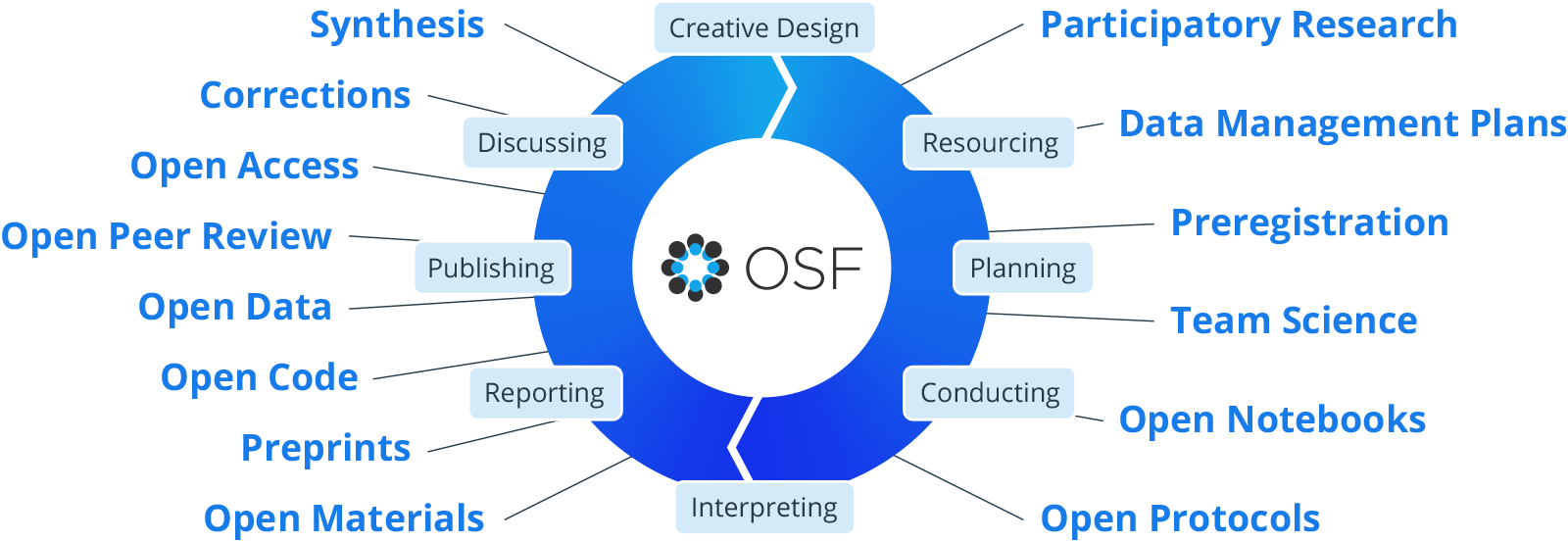Open science is a global movement that aims to make scientific research and its outcomes freely accessible to everyone. By fostering practices like data sharing and preregistration, open science not only accelerates scientific progress but also strengthens trust in research findings.
Adopting open science practices can enhance the quality, credibility, and reach of your research. Open science is a collaborative effort that welcomes everyone—regardless of role or experience—to participate in creating a more equitable and trustworthy research ecosystem.
These principles aim to democratize access to research, promote equitable resource distribution, foster accountability and trustworthiness, accelerate self-correction, and improve rigor and reproducibility.
The Open Science Framework (OSF) is designed to facilitate open science practices throughout the entire research process. Whether you're preregistering a study, organizing and documenting your data, or sharing final results, OSF provides a centralized platform to support transparency and collaboration.

At the Center for Open Science (COS), we advocate for lifecycle open science. There are open scholarship activities at every stage of the research lifecycle (see figure above) that individually and collectively contribute to improving science, with everyone playing a role:
Open access and preprints increase the accessibility of research findings by making research articles and publications freely available to readers. Share papers via OSF.
Open data, protocols, materials, and code promote transparency, reproducibility, and collaboration making research content freely accessible, which enables others to scrutinize, replicate, and build on the research. Use the OSF for managing, archiving, and sharing research.
Preregistration is a practice that enhances research transparency and accountability by requiring researchers to register their study's hypotheses, methods, and analysis plans before conducting the research, thereby reducing the likelihood of data manipulation and selective reporting.
Registered Reports is a two-stage peer review process that improves research rigor and reproducibility by reducing publication bias and prioritizing transparency and accountability.
Open source software allows for collaborative development by a community of volunteers, provides cost savings, increased security, flexibility, transparency, and can be customized to meet specific needs. COS software is open source on GitHub.
Team science is a collaborative approach to research that integrates diverse perspectives and expertise to address complex problems, offering benefits such as improved research quality, inclusiveness, productivity, and translation of scientific discoveries into real-world applications. See examples of team science in action.
Transparent peer review and open evaluation aim to increase engagement and accountability in the peer review process and throughout the research lifecycle, to promote a more open and collaborative research culture, and increase trust in the scientific process. Check out organizations experimenting with open evaluation and peer review such as eLife, Peer Community In, and Lifecycle Journal.

6218 Georgia Avenue NW, Suite #1, Unit 3189
Washington, DC 20011
Email: contact@cos.io

Unless otherwise noted, this site is licensed under a Creative Commons Attribution 4.0 International (CC BY 4.0) License.
Responsible stewards of your support
COS has earned top recognition from Charity Navigator and Candid (formerly GuideStar) for our financial transparency and accountability to our mission. COS and the OSF were also awarded SOC2 accreditation in 2023 after an independent assessment of our security and procedures by the American Institute of CPAs (AICPA).
We invite all of our sponsors, partners, and members of the community to learn more about how our organization operates, our impact, our financial performance, and our nonprofit status.